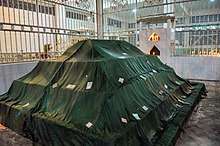Ghazi Burhanuddin
Syed Ghāzī Burhān ad-Dīn (Arabic: سيد غازي برهان الدين, Bengali: সৈয়দ গাজী বুরহানউদ্দীন) was a 14th-century Sufi Muslim figure living in Sylhet. He is said to have been the first Muslim to live in the Sylhet region.[1]
Shaykh Ghazi Burhanuddin | |
|---|---|
 The tomb of Gazi Burhan Uddin. | |
| Personal | |
| Died | Tultikar, Sylhet |
| Religion | Islam |
| Spouse | Syeda Khatun Jannat |
| Children | Syed Gulzar Alam |
| Muslim leader | |
| Based in | Burhanabad, Kushi Ghat, Tultikar, Sylhet |
| Period in office | Early 14th century |
| Post | Companion of Shah Jalal |
Life
Burhanuddin migrated to the village of Tultikar with his family. During the celebration of his newborn son's aqiqah, Burhanuddin decided to sacrifice a cow.[2] Gour Govinda, the King of Sylhet, was angered for what he saw as sacrilege due to his Hindu beliefs and had the newborn, Gulzar Alam, killed as well as Burhanuddin's right hand cut off.[3][4] Govinda had a reputation of being intolerant of minority peoples following faiths such as Islam, Buddhism and certain sects of Hinduism. Shortly after this incident, Qazi Nuruddin of Taraf celebrated his son's marriage ceremony of his son by slaughtering a cow for them to eat and was also punished by Taraf's feudal ruler, Achak Narayan. After both men being punished, Burhanuddin and Nuruddin's brother, Helimuddin, travelled to lower Bengal where they addressed their issues with Sultan Shamsuddin Firoz Shah.
A number of battles took place in order to conquer Sylhet and fight injustice, with Burhanuddin acting as guide. This expedition came to be known as the Conquest of Sylhet. The region was finally conquered with the help of a force led by Shah Jalal and his companions in 1303.[2]
Legacy
A road in Sylhet is named after him as Sayed Burhanuddin Road in Burhanabad (also named after him), Kushighat, Tultikar. A school called Ghazi Burhan Uddin Primary School can also be found in the road.[5] The road also contains him mazar (mausoleum).[2] The former police station in Commercial Street, London was redeveloped as a housing block in 1987 and named after him as Burhan Uddin House.[6] Also in the East End of London, there is a mosque named after him called the Burhan Uddin Masjid on Buckfast Street, Bethnal Green.
See also
References
- হযরত শাহজালাল (রঃ) ও হযরত শাহপরাণ (রঃ) এর মাজার. www.sylhetsadar.sylhet.gov.bd (in Bengali). Retrieved 11 December 2019.
- Hussain, Muhammad Sahul. "Burhanuddin (R)". Banglapedia: National Encyclopedia of Bangladesh. Asiatic Society of Bangladesh.
- EB, Suharwardy Yemani Sylheti, Shaikhul Mashaikh Hazrat Makhdum Ghazi Shaikh Jalaluddin Mujjarad, in Hanif, N. "Biographical Encyclopaedia of Sufis: Central Asia and Middle East. Vol. 2". Sarup & Sons, 2002. p.459
- হযরত শাহজালাল (রহ.) ও ইবনে বতুতার মিথস্ক্রিয়া. Bangladesh Pratidin (in Bengali). 1 April 2019. Retrieved 11 December 2019.
- Chowdhury, Muhammad Farruk Ahmed. "Sylhet Sadar Upazila". Banglapedia: National Encyclopedia of Bangladesh. Asiatic Society of Bangladesh.
- "The Bengali East End - Histories of life and work in Tower Hamlets" (PDF). Tower Hamlets.